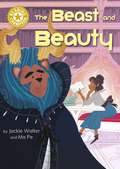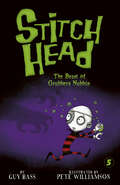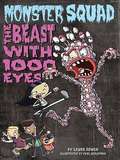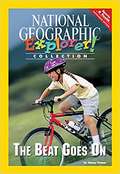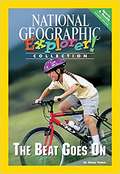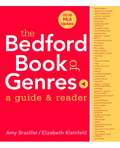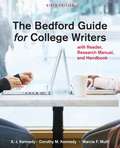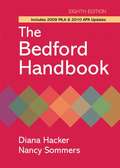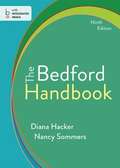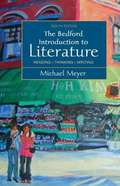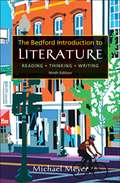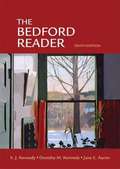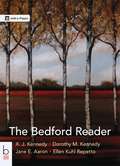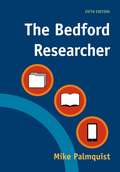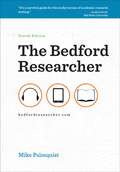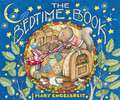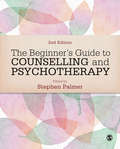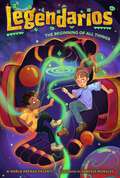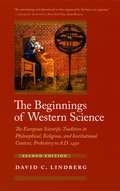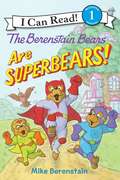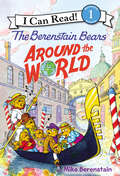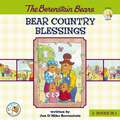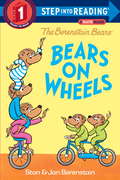- Table View
- List View
The Beast and Beauty: Independent Reading Gold 9 (Reading Champion #517)
by Jackie WalterThis story is part of Reading Champion, a series carefully linked to book bands to encourage independent reading skills, developed with Dr Sue Bodman and Glen Franklin of UCL Institute of Education (IOE) Fantastic, original stories are accompanied by engaging artwork and a reading activity. Each book has been carefully graded so that it can be matched to a child's reading ability, encouraging reading for pleasure. Perfect for 5-7 year olds.In this twist on the original fairy tale Beauty and the Beast, the Beast tells his side of the story.
The Beast of Grubbers Nubbin (Stitch Head #5)
by Guy BassIn this fifth book in the Stitch Head series, a terrible beast roams the town of Grubbers Nubbin every night, looking for food. Can Stitch Head and the others solve this monstrous mystery?The orphans at Castle Grotteskew are causing chaos ... and getting hungry. With no food in the castle, Stitch Head and Arabella head down to Grubbers Nubbin to see what they can pilfer, but there they encounter a terrifying, savage beast. Could one of Professor Erasmus&’s creations be on the loose? Features black-and-white gothic-inspired illustrations throughout.Welcome to Castle Grotteskew, where Mad Professor Erasmus makes creatures out of spare parts and then casts them aside, looking to make bigger and better. Stitch Head, his first creation, has a heart of gold and is always willing to show the other monsters the ropes—and bail them out of trouble! Join Stich Head and the other occupants of the castle in this exciting series, full of adventures of an almost-lifetime!
The Beast with 1000 Eyes #3
by Laura Dower Dave SchlafmanFunny and totally gross! Stella Min never gets scared. In fact, she's pretty certain that she is the bravest one in the Monster Squad. But lately she can't shake the feeling that she's being watched-all the time! Soon she's seeing floating eyeballs everywhere and quickly discovers it's the Beast with 1000 Eyes. She knows she needs to stop it, but how do you kill a monster than can blink you to death?
The Beat Goes On, Pathfinder Edition (National Geographic Explorer Collection)
by Nancy FintonNIMAC-sourced textbook
The Beat Goes On, Pioneer Edition (National Geographic Explorer Collection)
by Nancy FintonNIMAC-sourced textbook
The Bedford Book Of Genres: A Guide And Reader
by Amy Braziller Elizabeth KleinfeldThe Bedford Book of Genres collects compelling examples that tell stories, report information, and persuade their audiences and then invites students to unpack how they work in order to experiment with their own compositions—not only through writing, but through photography, sketching, audio recording, and other creative forms. The Guide presents a simple rhetorical framework for reading in any genre and supports students through every step of the composing process, from finding a topic and sources to choosing a genre, presenting your work, and creating an author’s statement about your composing choices. Guided Readings—in print and e-Pages—map out the rhetorical situation and conventions of common public and academic genres, while Guided Process sections follow the decisions that 5 real students made as they worked in multiple genres and media. With 16 topic clusters and a range of readings from short visual arguments to longer, more complex pieces, the Reader gives students a wealth of sources, models, and inspiration for their own compositions.
The Bedford Guide for College Writers with Reader, Research Manual, and Handbook, Ninth Edition
by X. J. Kennedy Dorothy M. Kennedy Marcia F. MuthWith its process-oriented rhetoric, provocative thematic reader, up-to-date research manual, and comprehensive handbook, The Bedford Guide for College Writers gives students the tools they need to succeed as writers and prepares them to be the confident, resourceful, and independent writers they will need to be.
The Bedford Handbook (8th Edition)
by Diana Hacker Nancy SommersThe Bedford Handbook carries on the Hacker tradition by responding to student writers' needs and to the way students need their handbook to work. Still a full-size handbook that doubles as a reference, the Handbook features clear, straightforward advice, hand-edited sentences, a user-friendly index, and a handy format. The eighth edition combines classic Hacker usability with a next-generation focus on academic writing and research and new navigation that helps students pull together advice and models for each assignment. Developed with the help of students and teachers at more than 35 colleges and universities, the new edition reflects the ways students write and revise in their composition course and beyond. What's more, The Bedford Handbook remains a portable size; it's still a comprehensive reference that's as easy to consult as it is to carry.
The Bedford Handbook (Ninth Edition)
by Diana Hacker Nancy SommersWhat habits are common among good college writers? Good college writers are curious, engaged, reflective, and responsible. They read critically. They write with purpose. They tune into their audience. They collaborate and seek feedback. They know credible evidence makes them credible researchers. They revise. The Bedford Handbook, based on surveys with more than 1,000 first-year college students, fosters these habits and offers more support than ever before for college reading and writing. New writing guides support students as they compose in an ever-wider variety of genres, including multimodal genres. New reading support encourages students to become active readers. Retooled research advice emphasizes inquiry and helps writers cite even the trickiest digital sources confidently and responsibly. Best of all, the Handbook remains a trusted companion for students because it is accessible, comprehensive, and authoritative. Instructors benefit, too: A substantially revised Instructor's Edition includes Nancy Sommers's personal mentoring--more than 100 new concrete tips for teaching with the handbook. Finally, integrated digital content is easily assignable and helps students practice and apply the handbook's lessons.
The Bedford Introduction To Literature: Reading, Thinking, Writing
by Michael MeyerThe Bedford Introduction to Literatureresponds to the teaching and learning needs of all kinds of literature classrooms -- and composition courses where literature is a focus. Author Michael Meyer understands that a particular challenge for instructors is that students do not necessarily see literature as relevant to their lives. They may be new to the study of literature, may have difficulty reading it, and may lack confidence in their critical abilities and writing skills. With these factors in mind, Meyer has put together a lively collection of stories, poems, and plays from many periods, cultures, and themes, with voices ranging from the traditional to the latest and hottest contemporary authors. As an experienced anthologist and instructor of literature, Meyer has a knack for choosing enticing selections -- including humorous works and readings from popular culture -- that students both enjoy and respond to. Complementing this unparalleled collection are proven editorial features that offer students real help with reading, appreciating, and writing about literature. The Bedford Introduction to Literatureis a book designed to bring literature to life -- and to make students life-long readers.
The Bedford Introduction to Literature: Reading, Thinking, Writing
by Michael MeyerNIMAC-sourced textbook
The Bedford Introduction to Literature: Reading, Thinking, Writing (7th edition)
by Michael MeyerThis best-selling anthology continues to combine a generous and vibrant selection of stories, poems, and plays with editorial features proven to help students read, think, and write effectively about literature. Now featuring unique visual portfolios packed with activities and contextual material, the new edition brings literature to life for students as never before.
The Bedford Reader (10th Ed)
by X. J. Kennedy Dorothy M. Kennedy Jane E. AaronOne of the most widely adopted composition readers of all time, "The Bedford Reader "continues to engage and inspire students with remarkable selections, outstanding instructional material, and a unique "Writers on Writing" feature in which 50 of the book's writers comment on their process and their work. Thorough coverage of critical reading, effective writing, and working with sources guides students, now more than ever, through their own academic writing. And an exciting visual dimension shows that rhetorical methods apply to both images and text. " The Bedford Reader "is a favorite of students for the Kennedys' clarity and wit, of instructors for the flexible and realistic view of the rhetorical methods, and of both for the superior selections and perceptive commentaries by writers worth reading.
The Bedford Reader 12th Edition
by X. J. Kennedy Dorothy M. Kennedy Jane E. Aaron Ellen Kuhl RepettoLong one of the most popular composition readers on the market, The Bedford Reader provides compelling readings by excellent writers. It takes a practical and flexible approach to the rhetorical methods, focusing on their uses in varied writing situations. The popular "Writers on Writing" feature illustrates the many ways writers create meaning from what they read and experience, and the Kennedys' instruction helps students connect critical reading to academic writing. The twelfth edition provides even more helpful guidance for students on critical reading and writing, a new appendix with advice on APA documentation, and an updated selection of compelling readings.
The Bedford Researcher
by Mike PalmquistTech-savvy and student-friendly, The Bedford Researcher addresses the kinds of writing students actually do and the kinds of sources they actually use, from multimodal projects and oral presentations to Web sites and digital databases. The Bedford Researcher strips away the complexities of research writing across the disciplines and offers the practical help students need to write with confidence while integrating electronic sources and tools into each stage of the process.
The Bedford Researcher, 4th Edition
by Mike PalmquistTech-savvy and student-friendly, "The Bedford Researcher" addresses the kinds of writing students actually do and the kinds of sources they actually use, from multimodal projects and oral presentations to Web sites and digital databases. "The Bedford Researcher" strips away the complexities of research writing and offers the practical help students need to write with confidence while integrating electronic sources and tools into each stage of the process. The new fourth edition strengthens students grasp of the arguments at the core of their sources, helping them navigate the world of academic research writing.
The Bedtime Book (A\fiona The Hippo Book Ser.)
by ZondervanNew York Times bestselling author Mary Engelbreit presents The Bedtime Book, a beautifully illustrated picture book that pairs sleepy time text with Mary&’s beloved, timeless art. From endearing poems and snuggly stories to sweet blessings and precious prayers, each page features different ways for you to read your little one to sleep, making this a book you can turn to night after night.Mama comes to tuck you in, Pulls the covers to your chin, Squeezes fingers, squeezes toes, Lays a kiss upon your nose.From bedtime prayers, poems, and sleepy-time rhymes to short, illustrated stories, The Bedtime Book gives you and your child a soothing bedtime world to explore as they prepare to drift off to sleep. Each reading selection is paired with Mary Engelbreit&’s iconic and inimitable artwork, creating a book of readings and calming illustrations that can be enjoyed by children, adults, and caretakers alike.The Bedtime Book:contains twelve unique reading experiences that can be read straight through or broken up and combined for a different bedtime adventure every night, entries that range from short prayers to stories spanning several spreadsfeatures several unique stories you won&’t find anywhere elseis a great collectors&’ item for fans of Mary Engelbreit&’s art
The Beginner's Guide to Counselling & Psychotherapy
by Stephen PalmerAre you interested in the field of counselling and psychotherapy or just starting out in your training? Trying to get to grips with the many different approaches and decide which are right for you? This book can help! An ideal introductory text that assumes no prior knowledge, leading authors in the field provide overviews of 26 counselling and psychotherapy approaches in accessible, jargon-free terms. Each approach is discussed using the same framework to enable easy comparison and evaluation, covering: · Development of the Therapy · Theory and Basic Concepts · Practice · Which Clients Benefit Most? · Case study Four further chapters offer an insight into the therapeutic relationship, working with diversity, professional issues, and research, while resources such as suggested reading, discussion issues, appendices of further information and a comprehensive glossary help you consolidate your learning. So look no further if you want to know the differences between counselling and psychotherapy, compare psychodynamic and psychoanalytic theories, discover how constructivist approaches can be applied in practice, learn about third wave CBT therapies, or just get an general overview of the field; this second edition of a bestseller gives you a whirlwind tour of the breadth, complexity, fascination and problems of the field of counselling and psychotherapy.
The Beginning of All Things (Legendarios #2)
by Karla Arenas ValentiTwins Emma and Martín get stuck at the beginning of time in this second book in the Legendarios chapter book series that&’s Magic Tree House meets Heroes in Training! Emma and Martín are settling into their new home in Chicago and getting ready to start at their new school. When they learn they&’ll be in separate classes for the first time, they aren&’t sure they can face so much change alone. But when life gets stressful, the siblings now have the perfect escape—into the book of legends! They enter the creation story of when the giant Ometecuhtli made the world. As soon as they arrive, they realize they have a major problem: it takes a magical object to activate Emma&’s necklace and open the portal home, but how can they find one when nothing exists yet?
The Beginnings of Western Science: The European Scientific Tradition in Philosophical, Religious, and Institutional Context, Prehistory to A.D. 1450 (2nd edition)
by David C. LindbergWhen it was first published in 1992, The Beginnings of Western Science was lauded as the first successful attempt ever to present a unified account of both ancient and medieval science in a single volume. Chronicling the development of scientific ideas, practices, and institutions from pre-Socratic Greek philosophy to late-Medieval scholasticism, David C. Lindberg surveyed all the most important themes in the history of science, including developments in cosmology, astronomy, mechanics, optics, alchemy, natural history, and medicine. In addition, he offered an illuminating account of the transmission of Greek science to medieval Islam and subsequently to medieval Europe. Beginnings of Western Science was, and remains, a landmark in the history of science, shaping the way students and scholars understand these critically formative periods of scientific development. It reemerges here in a second edition that includes revisions on nearly every page, as well as several sections that have been completely rewritten. For example, the section on Islamic science has been thoroughly retooled to reveal the magnitude and sophistication of medieval Muslim scientific achievement. And the book now reflects a sharper awareness of the importance of Mesopotamian science for the development of Greek astronomy. In all, the second edition of The Beginnings of Western Science captures the current state of our understanding of more than two millennia of science and promises to continue to inspire both students and general readers.
The Beltons' Imagination
by Deborah Zemke Jessica Lynne Rose Anathea ChartrandNIMAC-sourced textbook
The Berenstain Bears Are SuperBears! (I Can Read Level 1)
by Mike BerenstainThe Berenstain Bears discover the true power of lending a helping paw in this exciting addition to the classic New York Times bestselling series.When Brother, Sister, and Honey Bear pretend to be their favorite superhero characters, the whole neighborhood joins in on the game. It’s fun to fight evildoers, but when a young neighbor falls off his bike, the Bear siblings get to be real-life heroes!The Berenstain Bears Are SuperBears! is a Level One I Can Read book, which means it’s perfect for children learning to sound out words and sentences. Whether shared at home or in a classroom, the short sentences, familiar words, and simple concepts of Level One books support success for children eager to start reading on their own.
The Berenstain Bears Around the World (I Can Read Level 1)
by Mike BerenstainTravel the world in the Anywhere-Anyplace Machine with the Berenstain Bears in this lively addition to the classic New York Times bestselling series. From the plains of Africa to the Great Wall of China, there are more sights to see than points on a map! Beginning readers will love discovering fantastic new places alongside their favorite family of bears, complete with vivid and classic illustrations.The Berenstain Bears Around the World is a Level One I Can Read book, which means it’s perfect for children learning to sound out words and sentences. Whether shared at home or in a classroom, the short sentences, familiar words, and simple concepts of Level One books support success for children eager to start reading on their own.
The Berenstain Bears Bear Country Blessings (Berenstain Bears/Living Lights: A Faith Story)
by Jan Berenstain Mike BerenstainYoung readers will enjoy this three-book collection that is a part of the Living Lights™ series of Berenstain Bears books. Children will learn biblical values, morals, and invaluable life lessons. Included in the timeless collection you&’ll find The Berenstain Bears God Bless Our Home, The Berenstain Bears All Things Bright and Beautiful, and The Berenstain Bears Gets Involved.The Berenstain Bears Bear Country Blessings—part of the popular Zonderkidz Living Lights series of books—is perfect for:Early readers ages 4-8Reading out loud in classrooms, during story time, and at home or bedtimeBirthday gifts, Easter, holiday gift giving, or as a new addition to your e-librarySparking authentic conversations about biblical values, the importance of morals and ethics, and how to create a loving homeThe Berenstain Bears Bear Country Blessings is an addition to the Living Lights™ series that:Features the hand-drawn artwork of the Berenstain familyContinues in the much-loved footsteps of Stan and Jan Berenstain in this Berenstain Bears series of booksIs part of one of the bestselling children&’s book series ever created, with more than 250 books published and nearly 300 million copies sold to date
The Berenstain Bears Bears on Wheels (I Can Read!)
by Stan Berenstain Jan BerenstainAs the gradually increasing number of bears on wheels adds up through all kinds of combinations and permutations, beginning readers are offered a unique counting book, courtesy of the Berenstains.
